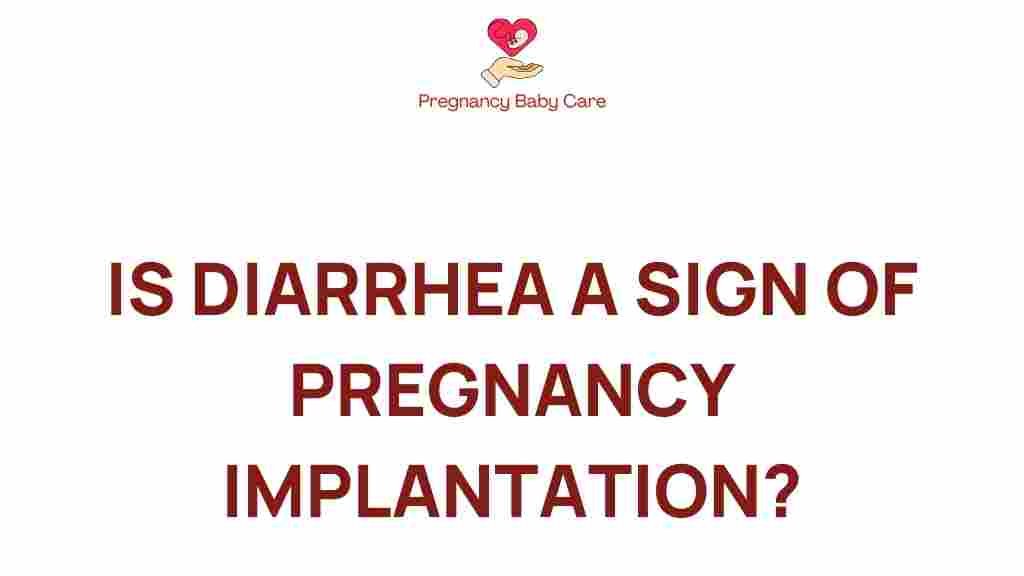Is Diarrhea a Hidden Clue for Pregnancy Implantation?
When it comes to early pregnancy symptoms, women often look for signs that indicate a potential pregnancy. While most are familiar with common symptoms like missed periods, nausea, and breast tenderness, many may not realize that diarrhea could also play a role in signaling pregnancy. In this article, we will explore whether diarrhea can be a hidden clue for pregnancy implantation, what early signs to look for, and how digestive health can be intertwined with women’s health.
Understanding Pregnancy Implantation
Implantation occurs when a fertilized egg attaches itself to the lining of the uterus, typically around 6 to 10 days after conception. This process is crucial for establishing a successful pregnancy. As the embryo develops, it releases hormones that can affect the mother’s body in various ways.
Link Between Diarrhea and Hormonal Changes
During this early stage of pregnancy, hormonal changes, particularly the increase in progesterone, can lead to a variety of gastrointestinal symptoms, including diarrhea. While it might seem counterintuitive, it is essential to understand that the body is undergoing significant changes that can affect digestive health.
- Progesterone Increase: This hormone relaxes smooth muscles, which can sometimes lead to altered bowel movements.
- Changes in Diet: Women may change their eating habits upon suspecting pregnancy, which can affect digestion.
- Stress and Anxiety: The emotional rollercoaster of potential pregnancy can also impact digestive health.
Common Early Signs of Pregnancy
Along with diarrhea, there are several other early signs of pregnancy that women should be aware of:
- Missed Period: One of the most reliable signs of pregnancy.
- Nausea: Often referred to as “morning sickness,” this can occur at any time of day.
- Breast Tenderness: Hormonal changes can lead to sensitivity and swelling.
- Fatigue: Increased levels of progesterone can lead to tiredness.
- Frequent Urination: As the uterus expands, it can place pressure on the bladder.
Diarrhea as a Pregnancy Symptom
While diarrhea is not typically listed as a standard pregnancy symptom, its occurrence can be linked to the hormonal changes and stress that accompany early pregnancy. Here are some ways diarrhea might manifest in relation to pregnancy:
- Hormonal Fluctuations: Elevated hormone levels can influence gut motility.
- Dietary Changes: Increased sensitivity to foods or dietary adjustments can lead to digestive issues.
- Increased Stress: Anxiety about pregnancy can impact gut health and function.
Digestive Health and Pregnancy
Maintaining good digestive health is essential, especially when considering pregnancy. Women should be aware of how their digestive system functions as it can impact overall health during this critical time. Here are some tips to support digestive health:
- Stay Hydrated: Drink plenty of water to keep the digestive system functioning smoothly.
- Balanced Diet: Focus on a diet rich in fiber, fruits, and vegetables to promote gut health.
- Manage Stress: Practice relaxation techniques such as yoga or meditation to help reduce anxiety.
Pregnancy Myths: Understanding the Truth
There are many myths surrounding pregnancy symptoms, and it’s important to separate fact from fiction. Here are some common misconceptions:
- Myth: Diarrhea is always a bad sign during pregnancy.
- Fact: While persistent diarrhea can indicate a problem, temporary digestive disturbances can occur due to hormonal changes.
- Myth: You can predict pregnancy based on symptoms alone.
- Fact: The best way to confirm pregnancy is through a home pregnancy test or consultation with a healthcare professional.
Step-by-Step Process: What to Do If You Suspect Pregnancy
If you suspect you might be pregnant, here’s a step-by-step process to follow:
- Take a Home Pregnancy Test: Follow the instructions carefully for accurate results.
- Monitor Your Symptoms: Keep track of any other symptoms you may experience.
- Consult a Healthcare Provider: Schedule an appointment for professional advice and confirm your pregnancy.
- Focus on Nutrition: Start consuming a balanced diet rich in vitamins and minerals.
- Maintain Digestive Health: Implement lifestyle changes to support your digestive system.
Troubleshooting Tips for Diarrhea
If you experience diarrhea, particularly if you suspect pregnancy, consider these troubleshooting tips:
- Stay Hydrated: Replace lost fluids with water or electrolyte solutions.
- Avoid Trigger Foods: Identify and eliminate foods that may irritate your stomach.
- Rest: Ensure you are getting enough rest to allow your body to recover.
- Consult a Healthcare Professional: If diarrhea persists for more than 24 hours or is accompanied by severe symptoms, seek medical advice.
Health Awareness: The Importance of Listening to Your Body
Awareness of your body’s signals is crucial when navigating the early signs of pregnancy. Understanding the relationship between diarrhea and pregnancy symptoms can empower women to make informed decisions about their health.
For more information on women’s health and pregnancy symptoms, visit this resource that provides valuable insights.
Conclusion
In conclusion, while diarrhea is not a common symptom associated with pregnancy, it can occur due to hormonal changes during the implantation phase. Women should remain aware of their bodies and consider other early signs of pregnancy. It’s essential to prioritize digestive health and seek medical advice when experiencing unusual symptoms. By debunking pregnancy myths and understanding the signs, women can navigate this exciting time with confidence and awareness.
Stay informed and proactive about your health; remember, knowledge is power. For further reading on digestive health and pregnancy myths, check out this external link.
This article is in the category Pregnancy and created by PregnancyBabyCare Team
